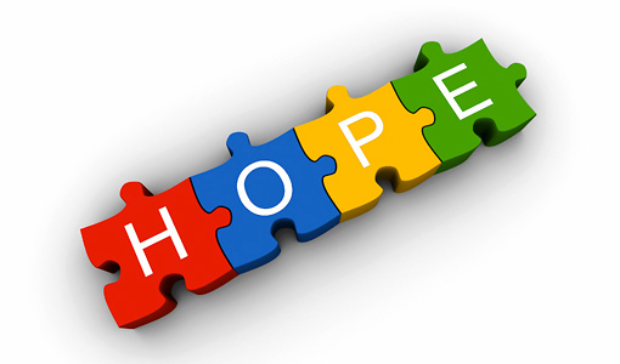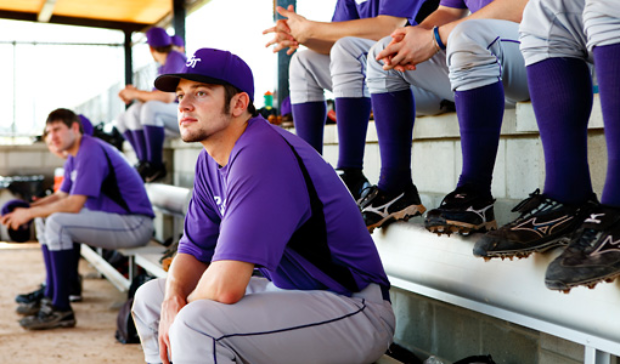The HIV/AIDS crisis is not over.
While AIDS has killed more than 25 million people worldwide, there are still more than 33 million people living with the HIV/AIDS virus.
Locally, 6,220 Minnesotans were living with the virus at the end of 2008, with another 368 confirmed new cases reported in 2009 (the highest annual number in 17 years).
View the 30 Years 30 Lives project.
Though such statistics are important for describing the seriousness of the HIV/AIDS pandemic, they also can create feelings of distress, fear and even hopelessness. Fortunately, an HIV/AIDS project at the University of St. Thomas has statistics that tell a different story. It’s a story of hope and community – our St. Thomas community – that began to see, care and respond to the HIV/AIDS pandemic.
In the last six years, more than 1,000 students in 50 St. Thomas classes have contributed to community organizations that provide services to individuals living with HIV/AIDS. And, through a service-learning initiative, the students take up the cause while gaining knowledge relevant to their courses.
In the summer of 2003, Dr. Kimberly Vrudny, professor of theology, participated in a service-learning workshop at St. Thomas, where she worked to incorporate a service component into her Theology of Beauty course. Concerned about the silence in the community surrounding HIV/AIDS, she developed a partnership with Open Arms of Minnesota, an organization that prepares and delivers meals to people living with HIV/AIDS, ALS, MS or breast cancer in the Twin Cities area.
Vrudny explains her motivation for reaching out to people with HIV/AIDS as being rooted in the Christian theological tradition. The Gospels give testimony to how Christ lived his life – compassionately present and open even to those excluded by the social order.
“Trained as an historical theologian,” Vrudny says, “I had written a dissertation about religious response to the Black Death in 1347, when perhaps half of all European men, women and children died in a period of 18 months due to the airborne disease.
“It was a response that haunted me,” she said. “People turned a blind eye to the suffering of those who were, literally, falling dead in the streets. I was troubled by the question of how I would have responded if I had lived then. And so it was only a matter of time before my attention turned to the question of how we, as Americans, as Minnesotans, as people of faith, as human beings, were responding to another plague – one that was being felt all around us, even as we, too, were guilty of turning a blind eye to it.”
In the spring of 2004, Vrudny implemented the service-learning project with Open Arms into her 300-level theology course. She saw clearly that students in her newly revised course gained a deeper understanding of theology – as well as the serious issue of HIV/AIDS – through their engagement in service.
That year, the St. Thomas service-learning advisory board also was thinking strategically in relation to four broad issues that lead to individual, communal and national security: high-quality education, economic stability, access to environmental resources and good health. Vrudny and Dr. Ellen Kennedy, then director of service-learning, set out to address these issues, and Vrudny took the lead in the area of public health.
Vrudny and Kennedy wrote a proposal requesting start-up funding from Minnesota Campus Compact, which supports partnerships between higher education institutions and community organizations to expand civic engagement. Minnesota Campus Compact liked what it saw and supported the university’s request. A service-learning initiative with organizations responding to the HIV/AIDS epidemic locally, St. Thomas’ project achieved one dimension of the advisory board’s strategic vision.
With Minnesota Campus Compact’s support, Vrudny created a service-learning program focused on HIV/AIDS. She designed and conducted companion workshops for faculty, and they designed their courses with a service-learning component in response to the HIV/AIDS pandemic. The service-learning program also began to hold an orientation each semester to introduce students to the work of the university’s community partners, as well as a celebration to mark the semester’s accomplishments in service and in learning.
These two aspects of the program have been compelling features for many students. Jillian Wright, a student in Don Beyer’s theology course last fall, learned from speakers and activities that HIV/AIDS can become a chronic condition rather than a terminal one if a patient has access to proper medication. “It [doesn’t necessarily] prevent [victims] from being or becoming successful,” Wright said. “[And] it doesn’t have to define them.”
Wright and others were moved by the comments of a speaker at their closing celebration. As a former client, he reminded students that their work with Open Arms is deeply appreciated. He explained that the only human contact some clients have is with the person who delivers the meal from Open Arms. He knows from experience that to simply see the friendly face of the Open Arms volunteer can make a world a difference.
The program quickly grew, capturing the attention of St. Thomas faculty members in disciplines as diverse as art history, biology, business, communication and journalism, health and human performance, justice and peace studies, music, philosophy, political science, psychology, sociology and theology. Kevin Winge, executive director of Open Arms, describes the St. Thomas faculty as “some of the greatest champions of social justice we work with. From the very beginning they realized the power of food and joined us in our efforts to change the world – one meal at a time.” In doing so, faculty developed a wide range of projects that not only contributed to the mission of Open Arms but also to the mission of St. Thomas.
The multitude of collaborations between the faculty and Open Arms provided students with a unique opportunity to apply their coursework to real needs. Lisa Ott, a student of Vrudny’s, learned not only theological perspectives on HIV/AIDS, but also that volunteers “can really make a difference – single-handedly. You can go in and make meals for countless individuals. You have to contribute, whether or not others are with you.” Ott continues to volunteer for Open Arms.
As faculty became more involved in the program, its partnership with Open Arms blossomed. Some students delivered meals to Open Arms clients, while others worked on various projects to assist the agency, such as creating video web profiles of Open Arms volunteers and constructing food-safety kits to provide to the clients. Vrudny also forged new partnerships with local HIV/AIDS organizations, including Clare Housing, which provides housing and medical services, and the Minnesota AIDS Project.
The program has expanded beyond the Twin Cities to include a global component. In 2006, the International Education Center at St. Thomas supported the development of Theological Reflection: AIDS, Apartheid and the Arts of Resistance, a January Term 2008 course in South Africa. Vrudny and Robert Strusinski, assistant professor of music, designed and taught the course in cooperation with Open Arms and one of its international partners, the J. L. Zwane Community Centre in Guguletu.
Twelve students traveled to Cape Town and to nearby Guguletu. The students learned that although apartheid is no longer an official governmental policy of South Africa, its legacy remains. Townships such as Guguletu, which were created by the minority-led government during the apartheid years, have millions of people still living in squalor. More than 70 percent of people are unemployed, and as many as one in three are living with HIV/AIDS.
Students studied how novelists, poets, visual artists, musicians and playwrights resisted oppression through artistic expression which contributed to the fall of apartheid. The students reflected on theological themes in the arts and how these artistic strategies have been used similarly to resist the conditions in which HIV/AIDS proliferates.
Last January, 10 participants in UST’s VISION program participated in another South Africa experience that Vrudny designed. Rebecca Cooke, a VISION student director and the trip’s leader, said the trip inspired her to take action closer to home. For example, she will participate in AIDS Action Day at the Minnesota State Capitol this year. “I’m now more interested in advocacy and public policy,” she said. “HIV/AIDS is a human rights issue that governments can influence. Getting involved in public policy is a way that a lot of change can be brought about.”
The program’s partnerships with the local and international HIV/AIDS organizations are flourishing, with more students each semester contributing to these organizations while building knowledge and skills for their future careers and lives beyond St. Thomas.
This story continues to unfold. Vrudny is working on a sabbatical project in Africa, Asia and Central America, titled “30 Years/30 Lives.” She is documenting the lives of 30 people impacted by HIV/AIDS, and meeting with the organizations devoted to their care. The project aspires to raise awareness about HIV/AIDS, and to challenge commonly held assumptions about who is affected by the virus. Vrudny will draw on the rich Christian tradition to encourage a just and compassionate response.
When she completes her project, Vrudny hopes to exhibit the photographs in select cathedral and seminary galleries around the United States and possibly internationally.
In addition to the service-learning and research initiatives under way, a new St. Thomas student club for HIV/AIDS awareness has been formed. The club’s founders and leaders became concerned about the issue through their service-learning courses, and are committed to raising awareness of the HIV/AIDS pandemic and educating St. Thomas students outside of the classroom. Though the club is still in its infancy, students’ initiative to expand awareness of and response to the pandemic outside of the classroom illustrates the university’s growing involvement in the global response to HIV/AIDS.
And that is how more than 1,000 students in 50 different classes with 16 different faculty members have created a story of hope at St. Thomas surrounding the HIV/AIDS pandemic.
Though the statistics of individuals infected by and living with HIV/AIDS continues to be startling, the university aspires to be a leader in developing innovative educational programs to contribute to the global conversation about HIV/AIDS and public health.
Now that’s hopeful.
About the Author: Tonia Bock is an assistant professor of psychology and the 2009-10 project director for HIV/AIDS initiatives at St. Thomas.





